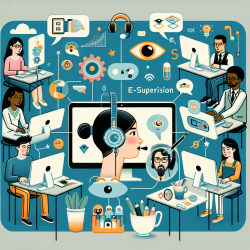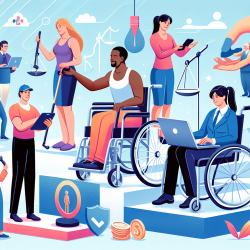In the field of speech-language pathology (SLP), the importance of effective supervision during graduate student teaching practica cannot be overstated. A recent study published in the International Journal of Telerehabilitation titled "The Use of E-supervision to Support Speech-Language Pathology Graduate Students during Student Teaching Practica" sheds light on how e-supervision can bridge gaps and enhance the supervisory process. This blog explores the key findings of the study and how practitioners can leverage these insights to improve their supervision practices.
Key Findings of the Study
The study utilized a mixed methodology approach, combining survey and interview data to compare in-person and e-supervision. The results revealed several critical insights:
- Perception of Adequacy: Graduate students felt that e-supervision provided adequate supervision, feedback, support, and communication.
- Benefits for Supervisors: E-supervision reduced travel time, allowed for more flexible scheduling, and facilitated the supervision of students in remote or underserved areas.
- Child Outcomes: Children on the caseload were less distracted during therapy sessions conducted under e-supervision.
Implementing E-Supervision in Practice
Based on the study's findings, here are actionable steps practitioners can take to implement e-supervision effectively:
1. Embrace Technology
Utilize desktop videoconferencing tools to conduct real-time supervision. Ensure that both supervisors and supervisees are comfortable with the technology and have access to necessary equipment.
2. Plan and Prepare
Advance planning is crucial. Ensure that all stakeholders, including school administrators, cooperating SLP supervisors, and technology staff, are on board and have agreed to the e-supervision process. Conduct trial runs to identify and address any technological glitches.
3. Select Qualified Supervisors
Choose supervisors who are not only experienced SLPs but also familiar with school-based settings. This ensures that supervisees receive relevant and practical feedback that aligns with their clinical experiences.
4. Foster Communication and Rapport
Establish strong communication channels between the university liaison e-supervisors (ULE-S), cooperating SLP supervisors, and graduate students. Initial in-person meetings can help build rapport and set clear expectations for the e-supervision process.
Encouraging Further Research
While the study highlights the benefits of e-supervision, it also identifies areas for further research. Future studies should explore:
- The impact of e-supervision across different educational settings and with diverse student populations.
- Comparative studies using only SLP supervisors to determine the specific benefits of e-supervision over in-person supervision.
- Longitudinal studies to assess the long-term effects of e-supervision on graduate student competency and child outcomes.
By embracing e-supervision and encouraging further research, we can continue to improve the quality of supervision in SLP graduate programs, ultimately leading to better outcomes for children.
To read the original research paper, please follow this link: The Use of E-supervision to Support Speech-Language Pathology Graduate Students during Student Teaching Practica.










